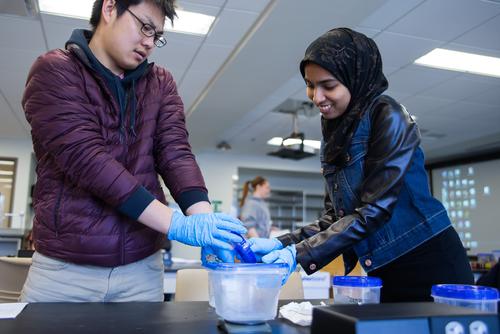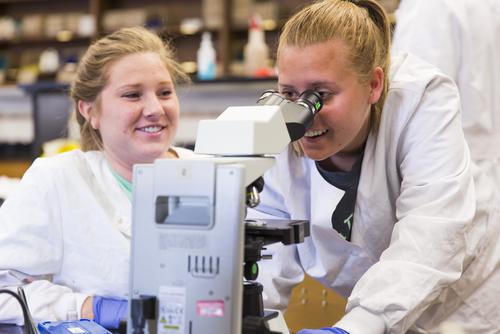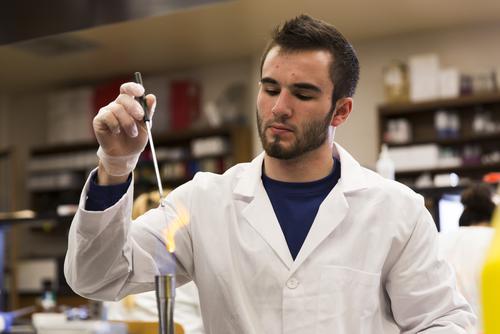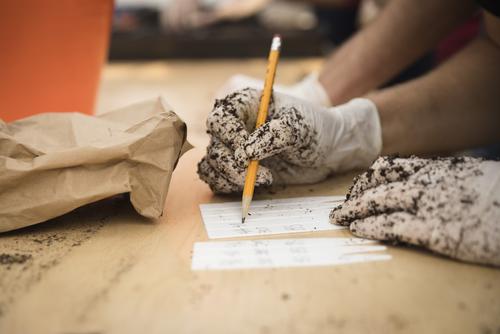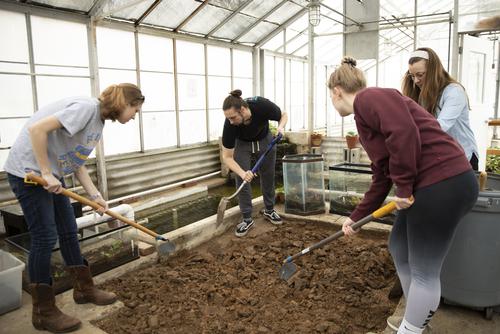Environmental Science
Continue to main content
Environmental Science (BS) Degree Map
Explore the courses you'll need to complete your degree.
Environmental Science Master's Outcomes & Careers
-
$95k
Biological Scientist
According to the Bureau of Labor Statistics, the mean annual salary for a biological scientist is $95,920.
-
$87k
Environmental Scientist
According to the Bureau of Labor Statistics, the mean annual salary for an environmental scientist and geoscientist is $87,480.
-
$53k
Environmental Science Technician
According to the Bureau of Labor Statistics, the mean annual salary for an environmental science and geoscience technician is $53,970.
The environmental science major curriculum includes coursework to prepare you to study and solve environmental problems. Students are required to take two Environmental Science seminars. These seminars assist the students in integrating the science courses with application toward environmental issues. You’ll complete a minimum of 120 credit hours to complete this degree, including the general education requirements and at least 39 senior division hours.
Required Courses
- BY163 Evolution and Ecology (4)
- BY332 General Ecology (3)
- BS105 Environmental Biology (3)
- CH184 General Chemistry I Lab (1)
- CH185 General Chemistry I (3)
- CH186 General Chemistry II (3)
- EC344 Environmental Economics (3)
- EN190 Writing and the Environment (3)
- EV201 Environmental Science Seminar I (1)
- EV401 Environmental Science Seminar II (1)
- EV454 Risk Assessment Applications (3)
- EVxxx EV Course (300-500 level) (3)
- GO110 Physical Geology (3)
- GO365 Environmental Soil Science (3)
- GO460 Environmental Hydrology (3)
- MA223 Elementary Probability and Statistics (3)
- PL429 Environmental Ethics (3)
Choose 3 hours from:
- CH450 Environmental Chemistry (3)
- EV400 Health Physics (3)
Choose 3 hours from:
- EV481-483 Internship (3)
- EV491-493 Research (3)
Choose 3-5 hours from:
- MA139 Applied Calculus (3)
- MA140 Analytical Geometry and Calculus I (5)
Choose 3-5 hours from:
- PH106 Physical Concepts (3)
- PH120 Introductory Physics I (5)
Choose 6 hours from:
- EV360 Recycling and Waste Management (3)
- EV386 Environmental Health (3)
- EV387 Environmental Law and Public Policy (3)
- UI331 Foundations of Biochemistry (3)
- GO372/072 Earth and Life Through Time (3)
Choose one advising track:
Biology – 31 hours
- BY173 Cellular and Organismal Biology (4)
- CH187 General Chemistry II Lab (1)
- CH341 Foundations of Organic Chemistry (4)
- CH342 Organic Chemistry Lab I (1)
Choose 2 Courses From:
- BY310 General Microbiology (4)
- BO310 Plant Biology (4)
- ZO310/010 Zoology (4)
Choose 6 Hours From:
- BY, BO, or ZO 3xx to 5xx (6)
Chemistry – 31-33 hours
- CH187 General Chemistry II Lab (1)
- CH271 Foundations of Analytical Chemistry (5)
- CH311 Foundations of Physical Chemistry (4)
- CH341 Foundations of Organic Chemistry (4)
- CH342 Organic Chemistry Lab I (1)
- PH121 Introductory Physics II (5)
- UI443 Professional Experience in Chemistry (3)
Choose One Course:
- CH313 Physical Chemistry Lab (3)
- CH343 Advanced Organic Chemistry (3)
- CH344 Organic Chemistry Lab II (2)
- CH391 Undergraduate Research (1)
- CH447 Advanced 1 and 2 Dim NMR Techniques (3)
- CH531/UI 331 Foundations of Biochemistry (3)
- CH545 Organic Preparations and Characterizations (3)
- CH575/075 Chemical Instrumentation (4)
Environmental Business - 30 hours
- AC221 Principles of Accounting I (3)
- AC222 Principles of Accounting II (3)
- EC225 Principles of Macroeconomics (3)
- FI361 Financial Management (3)
- MG301 Principles of Management (3)
- MI101 Introduction to Computer Applications (3)
- MI375 Management Information Systems (3)
- MK301 Principles of Marketing (3)
Environmental Geoprocessing and Soils – 28 hours
- AG440 Precision Agriculture (3)
- CH187 General Chemistry II Lab (1)
- GO445 Advanced Geographic Information Science (3)
- GO555 Soil Classification and Resource Management (3)
Choose 3-5 hours:
- CH234/034 Organic and Biological Chemistry (3)
- CH341/342 Foundations of Organic Chemistry and Lab (5)
Choose 3 Hours From:
- AG551 Water Management (3)
- GO340 Remote Sensing (3)
Choose 3 Hours From:
- AO427 Soil Fertility and Plant Nutrition (3)
- BY440 Ecology and Management of Wetlands (3)
Environmental Health – 29-31 hours
- CH187 General Chemistry II Lab (1)
- EV443 Epidemiology (3)
- EV453 Occupational Health (3)
- EV455 Industrial Hygiene (3)
- EV460 Introduction to Toxicology (3)
- EV551 Hazardous Materials Assessment (3)
Choose 3-5 hours:
- CH234/034 Organic and Biological Chemistry (3)
- CH341/342 Foundations of Organic Chemistry and Lab (5)
Choose 3 hours:
- BY485 Topics in Biology (3)
- BI543/043 Pathogenic Microbiology and Lab (4)
- GO445 Advanced Geographic Information Science (3)
- GO520 GIS Application (3)
- HL320 Community Health (3)
Environmental Policy and Communication – 27 hours
- EV386 Environmental Health (3)
- EV387 Environmental Law and Public Policy (3)
- IU309 Writing for Science and Technology (3)
- PS418 Public Policy Analysis (3)
- PS491 Topics in Political Science (3)
- SC200 Introduction to Communication Research (3)
Choose 3 hours:
- PS230 American Public Policy (3)
- PS280 Introduction to Global Issues (3)
- Social and Behavioral Sciences – 6 hours
- Constitution Requirement – 3 hours
- Written Communication – 6 hours
- Oral Communication – 3 hours
- Natural Sciences – 7 hours (from two disciplines, one to include a lab)
- Mathematics – 3 hours
- Humanities & Fine Arts – 9 hours (from at least two disciplines)
- Additional requirements – 5 hours (to include UI100 for native students)
- Civics examination
First Year
Fall Semester (13 Hours)
- UI100 (1)
- EN100 (3)
- BS105 (3)
- General Education (3)
- General Education (3)
Spring Semester (14 Hours)
- BY163 (4)
- CH184/CH185 (4)
- GO110/010 (3)
- EN190 (3)
Milestone: maintain 2.0 cumulative GPA
Second Year
Fall Semester (15 Hours)
- BY173 (4)
- CH186 (3)
- CH187 (1)
- General Education (3)
- General Education (3)
- Elective (1)
Spring Semester (16-18 Hours)
- BY/BO/ZO310 (4)
- CH341 (4)
- CH342 (1)
- EV201 (1)
- PH106 or PH120 (3-5)
- General Education (3)
Milestone: maintain 2.0 cumulative GPA
(summer courses are encouraged to avoid semesters exceeding 15 hours)
Third Year
Fall Semester (16-18 Hours)
- BY/BO/ZO310 (4)
- EC344 (3)
- EV454 (3)
- GO365 (3)
- MA139 or MA140 (3-5)
Spring Semester (15 Hours)
- BY332 (3)
- EV400 (3)
- GO460 (3)
- MA223 (3)
- General Education (3)
Milestone: maintain 2.0 cumulative GPA
Fourth Year
Fall Semester (15 Hours)
- BY or BO or ZO elective (3)
- EV Intern/Research (3)
- Required EV/GO/UI 3xx (3)
- General Education (3)
- General Education (3)
Spring Semester (16 Hours)
- BY or BO or ZO elective (3)
- EV401 (1)
- EV elective (3)
- Required EV/GO/UI 3xx (3)
- PL429 (3)
- General Education (3)
Milestone: maintain 2.0 cumulative GPA
A “Milestone” signifies a significant stage for a student in the completion of a degree.
What will it cost?
Get Funding for Your Education
Missouri’s opened the door to a more educated workforce. We want to help you walk through it. If you’re an adult learner and a Missouri resident returning to college, learn about the Fast Track Workforce Incentive Grant. It’s a statewide financial aid program that can be used to pursue a certificate, degree or industry-recognized credential in a high need area in Missouri. This major is eligible for the Fast Track grant.
Become a Redhawk.
Do more than dream about the future. Take the first steps to make it all happen.
Hands-on Learning
You’ll gain hands-on real-world experience through a required internship or research project as part of your coursework. The Department of Biology also uses resources such as Miller Reserve Wetlands Restoration Project, the Kelso Wildlife Sanctuary, and the Reis Biological Research Station to offer students experiential learning activities.
Alumna
"My education taught me not only how to speak and read science but also how to actually do science. I am a hands-on learner, so these experiences outside the classroom prepared me well for graduate school and beyond."
Donna Kridelbaugh
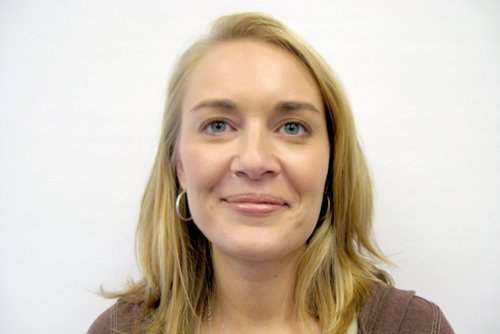
How Do Environmental Science Majors Gain Experience?
At Southeast, a biology education goes beyond the classroom. Our students are gaining valuable experience to complement their classroom work with internships and field experiences at:
- U.S. Environmental Protection Agency
- Missouri Department of Conservation
- U.S. Green Building Council
- Centers for Disease Control and Prevention
- Missouri Department of Natural Resources
- U.S. Fish and Wildlife Service
- U.S. Army Corps of Engineers
Happening in Biological and Environmental Sciences
The Will to Do
Cape Girardeau, Missouri 63701



